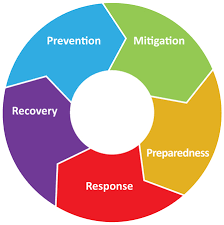The Importance of Emergency Management
Emergency management plays a crucial role in safeguarding communities and minimizing the impact of disasters. It encompasses a range of activities aimed at preparing for, responding to, recovering from, and mitigating the effects of emergencies and disasters.
Preparedness
One key aspect of emergency management is preparedness. This involves developing plans, conducting training exercises, and ensuring that resources are in place to effectively respond to various types of emergencies. By being prepared, communities can reduce the loss of life and property when disasters strike.
Response
During an emergency, a coordinated response is essential. Emergency management agencies work together to mobilize resources, provide assistance to those in need, and ensure that critical services continue to operate. Effective communication and swift action are vital components of a successful response effort.
Recovery
After an emergency has passed, the focus shifts to recovery. This phase involves helping individuals and communities rebuild their lives and infrastructure. It may include providing financial assistance, counseling services, and support for long-term recovery efforts.
Mitigation
Mitigation activities aim to reduce the risk and impact of future disasters. This can involve implementing building codes, improving infrastructure resilience, and raising awareness about potential hazards. By taking proactive measures to mitigate risks, communities can become more resilient in the face of emergencies.
Conclusion
In conclusion, emergency management is a vital function that helps protect lives, property, and livelihoods during times of crisis. By investing in preparedness, response capabilities, recovery efforts, and mitigation strategies, communities can better withstand the challenges posed by natural or man-made disasters.
7 Essential Tips for Effective Emergency Management in the Workplace
- Create an emergency plan with detailed procedures.
- Establish communication channels for emergencies.
- Train employees on emergency protocols regularly.
- Conduct drills to practice responses to different scenarios.
- Maintain emergency supplies and equipment in good condition.
- Stay informed about potential risks and threats in your area.
- Collaborate with local authorities and community resources for support.
Create an emergency plan with detailed procedures.
Creating an emergency plan with detailed procedures is a critical step in effective emergency management. By outlining specific actions to take during various types of emergencies, individuals and organizations can ensure a swift and coordinated response when disaster strikes. A well-thought-out plan that includes clear instructions, designated roles, communication protocols, and evacuation routes can help mitigate confusion and panic in high-stress situations. Regularly reviewing and practicing the emergency plan ensures that everyone is familiar with their responsibilities and can act quickly to safeguard lives and property.
Establish communication channels for emergencies.
Establishing communication channels for emergencies is a critical aspect of effective emergency management. Having clear and reliable channels in place ensures that crucial information can be quickly disseminated to the relevant parties during a crisis. Whether it’s through traditional methods like phone lines and radios or modern technologies such as social media and emergency alert systems, robust communication channels help coordinate response efforts, provide timely updates to the public, and ultimately save lives. Prioritizing the establishment and maintenance of these communication pathways is key to enhancing overall emergency preparedness and response capabilities within a community.
Train employees on emergency protocols regularly.
Training employees on emergency protocols regularly is a crucial aspect of effective emergency management. By ensuring that staff members are well-versed in the necessary procedures and protocols, organizations can enhance their preparedness and response capabilities during times of crisis. Regular training sessions help employees stay informed about the latest safety measures, evacuation procedures, and communication protocols, enabling them to act swiftly and decisively in emergency situations. This proactive approach not only safeguards the well-being of employees but also contributes to a safer work environment overall.
Conduct drills to practice responses to different scenarios.
To enhance preparedness and effectiveness in emergency management, it is essential to conduct drills that simulate various emergency scenarios. These drills provide valuable opportunities for responders to practice their roles, test communication systems, and identify areas for improvement. By engaging in regular training exercises, emergency management teams can enhance their coordination, response times, and decision-making skills, ultimately ensuring a more efficient and coordinated response when real emergencies occur.
Maintain emergency supplies and equipment in good condition.
It is essential to maintain emergency supplies and equipment in good condition to ensure their effectiveness during times of crisis. Regularly inspecting, restocking, and replacing items such as food, water, first aid supplies, flashlights, batteries, and communication devices can make a significant difference in the outcome of an emergency situation. By keeping these supplies well-maintained and readily accessible, individuals and communities can enhance their preparedness and ability to respond effectively when disaster strikes.
Stay informed about potential risks and threats in your area.
It is crucial to stay informed about potential risks and threats in your area as part of effective emergency management. By staying updated on local hazards, weather patterns, and other potential dangers, you can better prepare yourself and your community for emergencies. Whether it’s through official alerts, news sources, or community communication channels, being aware of potential risks allows you to take proactive measures to stay safe and respond appropriately in times of crisis. Remember, knowledge is power when it comes to protecting yourself and those around you during emergencies.
Collaborate with local authorities and community resources for support.
Collaborating with local authorities and community resources is a crucial tip in effective emergency management. By working together with law enforcement, emergency services, government agencies, and community organizations, a coordinated response can be developed to address emergencies swiftly and efficiently. Local authorities bring expertise, resources, and infrastructure to the table, while community resources provide valuable knowledge of the area and its residents. This collaboration ensures that support systems are in place to assist those in need during times of crisis, ultimately enhancing the overall resilience of the community in the face of emergencies.

